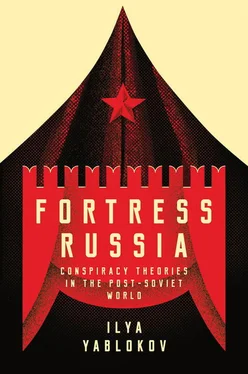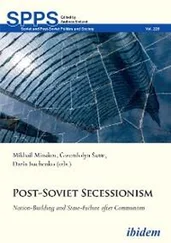It was rumoured that documents appearing on Putin’s desk provided evidence that Khodorkovsky had struck a deal with Condoleezza Rice which gave an assurance that when he was president of Russia, he would abandon nuclear weapons (Zygar, 2016, p. 60). This alleged deal with the US was an important element in the sealing of Khodorkovsky’s fate. His openness to the world, political ambitions and willingness to become part of the global financial elite, were taken as indications as to just how alien he was to Russia. During the second trial against Khodorkovsky in 2009–10, Dugin suggested that Khodorkovsky was an agent of the New World Order which aimed to destroy Russia’s national sovereignty and place it in the hands of the USA (Onlooker1001, 2009).
This third report triggered off the first arrests of Yukos employees and eventually Khodorkovsky himself. A plan to merge Yukos with Sibneft (another major Russian oil company), and then sell some of its shares to the American oil companies Chevron or ExxonMobil, posed a major threat to the Kremlin (Sakwa, 2014). This would have meant that ownership of Russia’s precious natural resources would partially be in the hands of foreigners, and that was completely unacceptable to some groups in the Kremlin. In such a scenario, Yukos, under the protection of a US company, would be untouchable by the Russian authorities. As Vadim Volkov (2008) notes, Khodorkovsky’s growing power put him into direct conflict with the state political apparatus: the tycoon was emerging as, potentially, the most powerful person in business circles, with threateningly clear political ambitions.
The attack on Yukos was justified by references to the oligarchic, Western-led plot and represented top businessmen as the powerful and dangerous Other. Russia’s natural resources and nuclear weapons, both of which were supposedly under threat, were seen as essential for sustaining the nation’s profits, political stability and world power status, and their threatened loss was seen as a justifiable reason for sullying Russia’s international reputation and dramatically reshaping internal affairs. For the siloviki group of Russian political elites, this was the starting point of their burgeoning power in the country. For the political elite in general, the approaching transfer of power from Putin to Medvedev, as well as challenges from outside the country, led to their empowerment and enabled them to turn the populist anti-Western conspiracy theories from an instrument of intra-elite squabbles into a semi-official political tool.
Defining the Domestic Threat
The ‘colour revolutions’ in Ukraine and Georgia had a tremendous impact on Russia’s domestic politics in the 2000s. Putin’s administration feared that the examples of other CIS countries could encourage Russian citizens to protest against the results of the elections in 2007–8. Being concerned about the outcome of the Ukrainian presidential elections in 2004, Pavlovskii argued that Russia was not ready for a new type of revolution and should focus on restraining the influence of the opposition (Samarina, 2004). As Robert Horvath (2013) has demonstrated, the political elites loyal to the Kremlin then began to develop a plan of ‘preventative counter-revolution’.
Legislative pressure on NGOs was among the first measures introduced as a part of this ‘counter-revolution’. Scholars have pointed to the important role played by international and non-governmental organizations in fostering civic activism on the eve of and during the events in Serbia in 2000, Georgia in 2003 and Ukraine in 2004 (Chaulia, 2006; O Beacháin and Polese, 2010). The existence of a wide and active network of civic organizations throughout Russia was perceived by the Kremlin as a serious threat to the successful outcome of the parliamentary and presidential elections in 2007–8. NGOs could question the results of the elections, thus creating an atmosphere of uncertainty which, in turn, could delegitimize Putin’s successor (Galbreath, 2009). As a result, the regime’s need to promote Putin as the nation’s leader and delegitimize his opponents made non-governmental organizations, some of which were very critical of the Kremlin, an obvious target for attack, justified, as we shall see, at least in part by conspiracy theories.
The foreign funding of Russian NGOs came in for attack after the events in Georgia in 2003. In his annual address to the Federal Council on 26 May 2004, Putin spoke about those NGOs which received funds from foreign sources and defended the commercial interests of their funders (Putin, 2004). This remark signalled two things: first, the Kremlin’s concern about the lack of transparency in funding of NGOs, that can start working against the regime, as had happened in Georgia. Second, Khodorkovsky’s active support of civic initiatives throughout the country and beyond (Sakwa, 2009, pp. 123–8) that Kremlin perceived as a serious domestic menace. The actual campaign against NGOs took some time to develop and was only launched a year later, in May 2005. It was preceded by a report from Nikolai Patrushev, then head of the Federal Security Service (FSB), which claimed that foreign intelligence was using new methods of surveillance and operated in the CIS countries under the guise of non-governmental organizations (Saradzhyan and Schreck, 2005). One month later, Putin replied to Patrushev’s report by expressing a strong objection to the funding of public activities from abroad and promising to curb it (Human Rights Watch, 2005).
This conspiratorial narrative thus linked NGOs with foreign intelligence, emphasizing their ‘otherness’ and the threat they posed to the people of Russia. In this new twist in Kremlin-sponsored discourse, it was the activities of NGOs, which were funded by foreign sources, which threatened Russian sovereignty. The term ‘sovereignty’ became pivotal to the anti-Western conspiracy discourse, which was widely propagated through the media from 2005 onwards.
Russia’s sovereignty, along with the development of civil society, were the focus of Putin’s address to the Federal Council that year (Putin, 2005). Following his speech, NGOs became strongly associated with foreign subversion and were depicted in the media as an ideological and financial framework by means of which Putin’s regime would be overthrown. After 2005, numerous publications by pro-Kremlin intellectuals and spin doctors developed this idea further. Vitalii Ivanov, one of the pro-Kremlin public intellectuals who participated in the campaign against ‘Putin’s enemies’ in 2007, claimed that ‘Western foundations’ ( zapadnye fondy ) gave donations to a range of opposition parties, regardless of their political views (2006, p. 112). The claim that they were politically indiscriminate was used to convey the cynicism of NGOs and their ‘sponsors’ from the West, and reinforced the argument that Western foundations were aimed at depriving Russia of her independence.
Another prominent pro-Kremlin public intellectual and Duma deputy, Sergei Markov, claimed that people at the Ukrainian rallies were fighting for freedom and honour, while the organizers of the rallies had become wealthy ‘revolutionaries’, generously funded by American and European foundations (Markov, 2005). This argument bolstered Putin’s accusation that NGOs were interested primarily in commercial benefits, not the well-being of society. Hence the freedom that NGOs enjoyed before 2005, including their ability to get funding from foreign sources, was a privilege which they were now to lose because they were beginning to be put under the control of the government. Many pro-Kremlin public intellectuals depicted NGOs as centres of the ‘Orange Revolution’; they enjoyed excessive freedom within Russia, while remaining under foreign financial and organizational control (Iur’ev, 2004).
Читать дальше
Конец ознакомительного отрывка
Купить книгу












